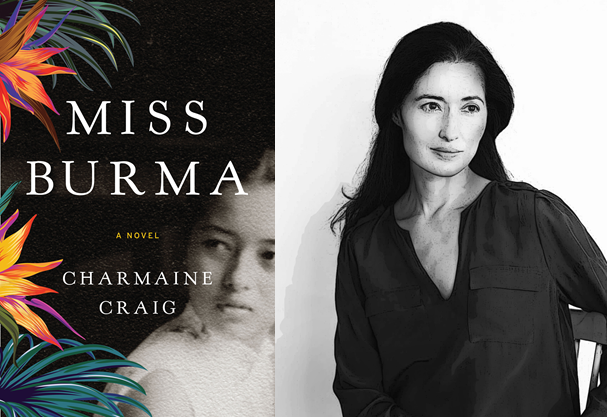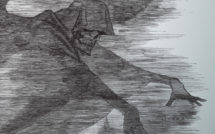

Khin had seen him before, the young officer (an Anglo-Indian?). She had noticed his hands, strong and clenched by his sides, and the restless way he charged from one end of the seaport to the other, as if he were trying to expend something combustible stored within him. One afternoon, she had watched as he’d ridden a launch out toward a ship anchored in the bay; he’d stood at the bow, leaning into the wind, arms crossed over his chest. Was he so sure of his balance? she wondered. Or did some part of him hope to tempt fate, as she sometimes darkly did when she ventured out to the very edge of this jetty, where she stood now, in September 1939, with the boy who was her charge.
She had come to Akyab four months earlier to work as a nanny for a Karen judge, who made a practice of hiring people of their own persecuted race, or so he said. His six-year-old son often drew her out to the port, where from the jetty they could look out over the fitful water and watch the beautiful seaplanes landing and taking off. She loved the planes as much as the boy did, loved their silent sputtering grace—though her love was distressed. Sometimes she saw a plane swerve and imagined it falling like a bird shot out of the sky.
The boy pointed up to the silvery body of a plane ascending toward a cloud, and she shuddered, drew him sharply from the rotting end of the planks giving way to the sea.
“Time to go,” she told him.
“I want to watch until we can’t see it anymore,” he said.
He hadn’t been told that Japan was at war with China, that Germany had invaded Poland, or that France and Britain had declared war on Germany. His innocence made her feel guilty, as though by encouraging his fidelity to the planes she were somehow betraying him. But she was being silly, she knew, imagining that these planes were doomed. “War will never come here,” the sessions judge had told her, after listening to his nightly English radio program. “It’s Malaya the Japs want. There’s no penetrating our territory but by sea, and when it comes to the sea the British are unsinkable.”
“I have a surprise for you at home,” she lied to the boy. She shielded her eyes from the glare and tried to give him her most convincing smile.
The boy studied her for a moment. “What surprise?” he said.
“I’ll tell you when we’re there.”
There was no surprise, of course, and as they stumbled back toward land over the splintered planks (as she stumbled away from the unbidden image of her body slipping into the shivering waves), she kept her eyes on her feet and searched her mind for some small treat the boy might deem acceptably unforeseen. He was already beginning to doubt her reliability. Perhaps the maid had bought a few cream puffs from the Indian who came around on Wednesdays.
She was halfway to the shore again when she looked up and saw the officer watching her intently from the other side of the wooden gate leading to the jetty. His white hat cocked to one side, he leaned against the rickety gate as though to block her path back to land. Even
across the distance, she could see he didn’t hesitate to scrutinize her hips, her hair. If any other man had stared at her in such a way, virtually eating her with his eyes, she would have—well, she would have laughed.
The officer suddenly shouted at her, coming out with a confusion of English words of which she clearly caught only “not”—something he said with great emphasis and at least twice. He was surely instructing her to steer clear of the jetty (the way he further cocked his head and pointed away from the water told her as much), and his loudness and directness should have offended her; yet there was something mellifluous, some kindness, in his baritone voice.
She stopped five feet from the gate, taking the boy’s warm hand in hers, and steadying herself against a fresh assault of wind and sea spray. The officer’s gaze narrowed now on her eyes, and she felt herself blush as she absorbed the full force of his face—the heavy jaw, the mouth too full to be truly masculine, the ears that stuck out beneath the brim of his hat. There was nothing extraordinary about his version of handsomeness, about his large features (though he did have something of the elephant about him!); there was nothing unusual about his authoritative claiming of the port (all the officers seemed to claim Burma, as if they were not also subjects of His Majesty the King of England). But she had to admit that he was more striking than she had imagined him from afar. What was so very unforeseen (what she must have noticed without noticing) was the expression of meekness in his eyes, markedly in contrast to his obvious physical strength. Even the smile that he now leveled at her own lips, and that she unwillingly returned, seemed aggrieved.
“Are we in trouble, nanny?” the boy asked.
“Perhaps,” she said quietly.
Again, the officer began to speak, to express something to her in English, while beside them a seaplane revved its engine.
“Look!” the boy said, pointing to the plane that started to skip over the waves.
For a moment all of them stood in mute wonderment, watching the plane lift off into the vivid blue sky, where it banked and peaceably headed northwest, as though a war were not raging somewhere beyond the horizon.
“Beautiful,” she heard the officer say over the whistling wind.
He had stepped back from the gate. And when their eyes met again, she felt so embarrassed that she yanked the boy forward, yanked open the gate, and hurried past the officer and his spontaneously stricken face.
That the officer had taken an interest in her was something she found both agreeable and unsettling—unsettling just because it reminded her that she had been avoiding taking an interest in herself for fear of discovering something distinctly disagreeable inside.
She could remember moments of tranquillity from her youth, when her father still had his land and life, when her mother still had her smile. There hadn’t been the features of what others might call an easy childhood. She and her younger sister had never attended school, but worked their orchards from the start. Yet there had been ample time to climb and run and play, to bathe on the riverbank, to sit as Mama braided their hair, and to sing.
Singing—that was their ease, their art, their prayer, their lesson. They sang to the Karen god Y’wa, who, she had been taught, was also the Christian Creator. Stretching out under the mosquito net at night, they sang to the spirits of the orchard. And then, as she and her sister fell into sleep’s embrace, they listened to Mama sing their people’s story. Long ago, the story went, we came here along a river of sand. We came upon a fearsome, trackless region, where, like waves before the sea, sands rolled before the wind. We came to this green land, to the sources of the waters and the lakes above. Until we fell among the Siamese and Burmans, who made slaves of us. They took our alphabet and holy books, but our elders promised the coming of our Messiah. White foreigners would bring a holy book, they said. Give thanks exceedingly for the coming of the white men. Give thanks, sons of the forest and children of poverty, for before their coming we were poor and divided and scattered in every direction.
Before the white men, we lived on one stream beyond another, and the Burmans made us drag boats and cut rattans. They made us collect dammer and seek beeswax and gather cardamom; weave mats, strip bark for cordage, pull logs, and clear land for their cities. They demanded presents—yams, bulbo-tubers of arum, ginger, capsicum, flesh, elephant tusks, and rhinoceros horns. If we had no money to give them, they made us borrow and thus become their slaves again. They made us guard their forts, act as guides, and kidnap Siamese while they tied our arms. They beat us with rods, struck us with fists, pounded us for days on end, till many of us dropped down dead. They made us march carrying rice for soldiers, so that our fields fell fallow and great numbers of us starved. They kidnapped us, so that we sickened with yearning for one another, or begged for mercy and met with immediate death. We fled to the streamlets, to the mountain gorges, so they could not take our paddy or our women. But they found us and took from us again and forced us to assemble near the city, where great numbers of us perished.
And in our turmoil we prayed beneath the bushes. “Children and grandchildren,” the ancient sayings of the elders went, “Y’wa will yet save our nation.” We prayed as the rains poured and the mosquitoes and leeches bit us. “If Y’wa will save us, let him save speedily. Alas! Where is
Y’wa?” we asked. “Children and grandchildren,” said the elders, “if the thing comes by land, weep; if by sea, laugh. It will not come in our days, but it will in yours. If it comes by sea, you will be able to take breath; but if by land, you will not find a spot to dwell in.”
“And how did the white foreigners come, Mama?” she sometimes sleepily asked from her mat under the mosquito net.
By sea! By sea! Mama’s song replied, yet Mama sang it like a lament.
Charmaine Craig is a faculty member in the Department of Creative Writing at UC Riverside, and the descendant of significant figures in Burma’s modern history. A former actor in film and television, she studied literature at Harvard University and received her MFA from the University of California, Irvine. Her first novel, The Good Men (Riverhead), was a national bestseller translated into six languages.
Excerpted from MISS BURMA © 2017 by Charmaine Craig. Reprinted with the permission of the publisher, Grove Press, and imprint of Grove Atlantic, Inc. All rights reserved.
Photo: Charmaine Craig, Roy Zipstein
Published on May 2, 2017.




